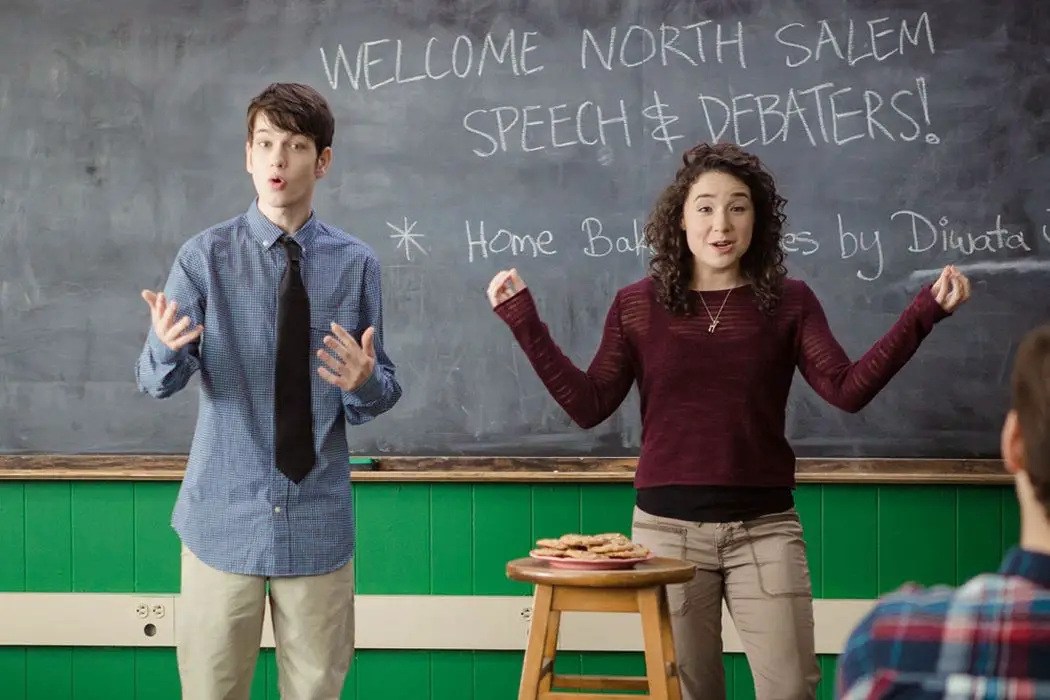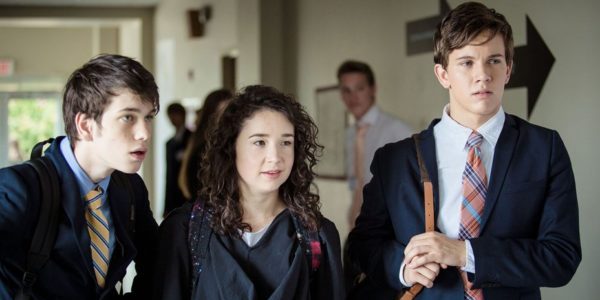SPEECH & DEBATE: Teen Film Lacks Focus

Eric D. Bernasek lives on the island just north of…
For a few months in 2007 and 2008 I worked at a bookstore on Boylston Street in Boston, just a few blocks from the Boston Public Library. On one busy Saturday I noticed a customer whose faced looked familiar to me and, after several minutes of careful consideration, concluded that it was in fact Todd Field, Academy Award nominated and Golden Globe winning writer/director of In The Bedroom and Little Children who had also been an actor in films by Woody Allen and Stanley Kubrick. Following a few more minutes of nervous apprehension, I gathered what little courage (or foolishness) was at my disposal and approached him, tentatively. “Pardon me. I’m sorry to bother you…”
What looked to me to be a blossoming mix of amusement, embarrassment, and horror took root on his face as I prepared to go on. A female friend of his stood close by, apparently relishing the awkward display that was taking shape. I continued: “Were you in a movie called New Port South?” He was silent for several moments as his expression quickly shifted from confusion to surprise before he finally confirmed that he had indeed played the part of “Mr. Walsh” in the direct-to-video indie flick about a small band of disaffected teens who stage a revolt in their suburban Chicago high school.
New Port South is a scrappy little movie (with a fantastic soundtrack) that also happens to be the directorial debut of James Hughes, son of John Hughes, whom you most likely know as the writer/director of The Breakfast Club, Ferris Bueller’s Day Off, and other undisputed classics from the Golden Age of teen movies. Let’s be clear. It wasn’t that I had surveyed the totality of Todd Field’s career and deemed his role in this laughably obscure teen movie to be the one shining moment that I – a “student of high school movies,” as I pathetically identified myself to him – then wanted to highlight. In all honestly, at that time I was aware of In The Bedroom, and I had been wowed by the trailer to Little Children, but I hadn’t the slightest idea who had directed either film, and I didn’t know who Todd Field was aside from his having played a part in what was, at best, a footnote in the history of teen film.
Now, there’s a point to my telling you all this: When it comes to movies about high school, I have a degree of enthusiasm that has been proven to skew my perspective.
The Implications of Adaptation
Before appearing on screens big and small in April of 2017, Speech & Debate had been, roughly a decade prior, a successful Off-Broadway play written by Tony Award-winner Stephen Karam, who was also responsible for adapting his play for the screen. If you watched the movie without knowing its pedigree, you might not realize it had its first life on the stage. It feels perfectly at home as a teen film. And in preparing this review I’ve had some difficulty in determining whether or not it makes sense to treat it purely as a teen film rather than as an adaptation.

From one perspective, it makes no difference. A work of art, whether stage or screen or whatever else, should be able to stand on its own merit. The viewer certainly doesn’t need to know that Speech & Debate came into the world at an Off-Broadway theater. But knowing that it did raises interesting questions about what happens on screen and why. It also helps to explain why certain things about the movie don’t quite work.
Cast of Outcasts
It’s recently been exposed that the mayor of Salem, OR has been engaging in extra-marital affairs with more than one of his underage interns, and local crank Gary Crenshaw (Jeremy Rowley) has taken to school board meetings to histrionically caution that this licentiousness will surely trickle down to the high school if the drama club moves forward with its production of “Once Upon a Mattress”. Members of the school board agree to alter the musical so that it no longer appears to glorify pregnancy out of wedlock, and so begins the plights of the movie’s three main characters, who are all students with parents serving on the board.
Diwata (Sarah Steele) is a theater geek whose dramatic and musical abilities don’t yet match her ambitions. She’s scandalized by the censorship and repeatedly disappointed that she is not more prominently cast in the school’s dramatic productions. At home she vents her frustrations on YouTube, where she uploads musical tirades against the drama teacher and other potentially deserving targets of scorn.
Howie (Austin McKenzie) is the new kid at school. He’s moved to Salem from Portland, the big city, where his homosexuality was not as unusual and he didn’t have to work so hard to find a boyfriend. His introduction to the story involves him setting up a Tinder-esque date with an older man who turns out to be the same drama teacher upon whom Diwata heaps her contempt.
Solomon (Liam James, “that kid” from The Way Way Back) is a nerd, the outcast among outcasts according to the logic of teen film. He dreams of a career in journalism – or, at least, being accepted to a college with a respectable journalism program – but he’s stymied by Miss Riggi (Sarah Baker), the faculty advisor in charge of the school paper, who is exasperated by Solomon’s attempts to seek out stories more consequential than the new Snapple machine in the cafeteria.
What’s the Conflict?
Our three teen protagonists are brought closer together when Howie’s request that the school board allow him to establish a gay–straight alliance is denied. As an alternative, the principal (a fittingly spineless Roger Bart) suggests that Howie join – or start? really, it’s confusing – a nationally recognized club called, not so surprisingly, Speech and Debate. Howie demurs, but Solomon receives the same suggestion from his beleaguered editor, and soon all three unfortunates are in the midst of a lackluster training montage that will lead them to some manner of regional competition.
And then things get… unconvincing. There’s some chemically assisted awakening, and some parental stakes-raising. Ultimately, there’s a climax that involves a satisfyingly ridiculous musical number with a belter of a chorus – “Hold it in!” – that absolutely must be a snide response to Disney’s now infamous “Let It Go.” But in the midst of all this you’ll likely find yourself wondering, what’s the point? Why these three kids? And what do they want, really?

In Karam’s play, Walter Healy (here played by Skylar Astin), the drama teacher Howie meets for, shall we say, extra-curricular activities is a predator, not the incidental character that’s portrayed in the film. As Howie’s abuser, Diwata’s theatrical tormenter, and Solomon’s journalistic subject, Healy is an obvious locus of anger that’s sufficient to push the plot forward. Without that impetus, the story lacks focus, and its characters are without compelling motivation. (What’s worse, as other reviewers have pointed out, leaving this out of the plot ironically echoes one of the story’s main complaints: the unfortunate tendency among adults in positions of power to denude a fiction’s potential impact through needless censorship.)
To make this problem worse, much of the film’s conflict relies on difficulties that Solomon has after what’s meant to be an epic failure at the regional Speech and Debate competition. But what his failure was and, more specifically, why it would make him an utter laughingstock to his peers is a complete mystery. There is simply nothing he does that justifies the reaction he is made to suffer.
The Good with the Bad and the Ugly
Shortcomings aside, Speech & Debate isn’t a bad movie. It may gloss over plot holes here and there, but it’s enjoyable. And it features at least one thoroughly captivating performance in Sarah Steele’s Diwata. Steele played the character in Speech & Debate’s original Off-Broadway run, and it’s clear that she’s come to embody Diwata in a way that now appears second nature.
More relevant to this viewer (and to the melodramatic personal narrative that began this review), Speech & Debate is a teen film that’s willing to pay homage to its forebears, however inconspicuously it may do so. The Breakfast Club, Risky Business, Dirty Dancing, Pump Up the Volume… Even latter day kinfolk like Rocket Science and The Hard Times of RJ Berger all get brief nods, for those in the know who might be paying attention.
But, as endearing as it may be, reference is easy. And this is a movie that repeatedly tries to draw in things outside of itself – from Philippine mythology to, potentially, Steely Dan, not to mention the catalog of Broadway musicals that appear in one way or another. This is also something of a love letter to theater geeks, by the by.

What’s more substantial is the themes that repeatedly show up in teen film. Here we have outcasts struggling to be heard; parents who don’t, or can’t, talk to their teens; teachers and administrators who want to help but are constrained by institutions and/or propriety; counterculture(s) seeping into the sheltered world high school attempts to create; substance use/abuse as a way of subverting conformity and/or bypassing the expectations of parents/society; self-mortification as a route to intimacy with peers.
And yet the presence of all these themes, while they add depth to what could otherwise be a shallow endeavor, doesn’t make up for the movie’s greater shortcomings. Speech & Debate is fun to watch. And it’s not without moments of brilliance. But it fails to cohere in a way that would make multiple viewings more, not less, rewarding.
Where do you think Speech & Debate stands in the pantheon of teen film? Will teens still be watching it in five, ten, fifteen years?
Speech & Debate was released in theaters on April 7, 2017 and is currently available online at Amazon Video.
Does content like this matter to you?
Become a Member and support film journalism. Unlock access to all of Film Inquiry`s great articles. Join a community of like-minded readers who are passionate about cinema - get access to our private members Network, give back to independent filmmakers, and more.
Eric D. Bernasek lives on the island just north of the island that is Montreal. He thinks too much and writes too little. He is currently working on a book about movies from your childhood: "Does Barry Manilow know that you raid his wardrobe?" – Authority and Rebellion in Movies About High School.













